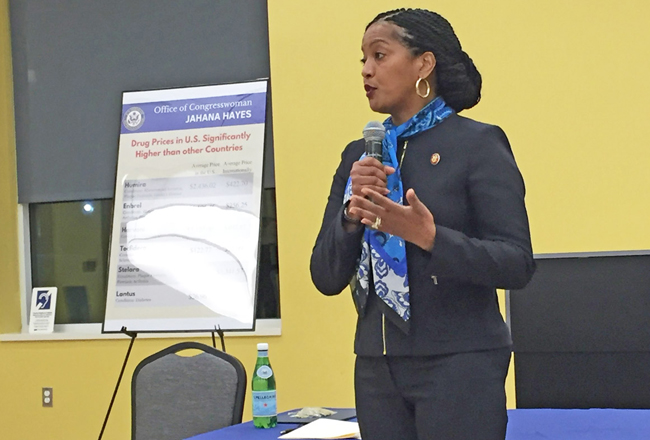U.S. Rep. Jahana Hayes calls for bipartisanship, health care solutions at Newtown meeting
The high costs of health care and the perceived partisan inertia at the state and federal levels were the main talking points of a Jan. 21 town hall meeting featuring U.S. Rep. Jahana Hayes at the Newtown Community Center.

Describing her just-completed first year as a congresswoman as “a baptism by fire” ”“ marked by a pair of federal government shutdowns, the Chinese trade war, and of course the House”™s impeachment vote ”“ the Connecticut Democrat said that she had visited all 41 municipalities in her district, and would continue to do so this year.
She also said her work in Washington had helped save $825,000 for her constituents and that she had been a driving force behind $200,000 in federal grants for individuals and businesses in her district, which includes Bethel, Brookfield, Danbury, New Fairfield, Newtown and Sherman.
But what could have turned into a re-election ad ”“ Hayes is facing four potential Republican opponents this November, including Robert Hyde, one of the figures in the Trump-Ukraine scandal ”“ quickly became a give-and-take with an appreciative crowd of about 300, which applauded her throughout.
The first question from the audience was, perhaps inevitably, about her vote in favor of opening the impeachment inquiry, for approving the two articles of impeachment against the president and for sending those articles to the U.S. Senate. Initially skeptical about impeachment, she said that after learning details of the phone call with Ukraine President Volodymyr Zelensky, “I had questions. I don”™t know how you could see and hear what I did and not have follow-up questions.”
She was careful to add that, had a Democratic President like Bill Clinton or Barack Obama similarly withheld congressionally approved funds to a foreign government until it announced an investigation of a political opponent, she would have voted the same way.
While maintaining that she personally tries to work in a bipartisan fashion, Hayes admitted that the atmosphere at both the state and federal level is now “so hyper-partisan.
“I don”™t know what to expect when I get back (to Washington),” she said, although she expects the impeachment process to be concluded, one way or another, over the next two weeks.
The National Teacher of the Year in 2016, Hayes expressed dismay and astonishment at how few of her colleagues understand the state of education ”“ and the laws governing it ”“ today. Her mere mention of the title of U.S. Secretary of Education drew some knowingly derisive laughter, even without her mentioning the secretary”™s name, Betsy DeVos; the latter has been frequently lampooned for her apparent lack of qualifications for and performance in that role.
Hayes further encouraged constituents to support local teachers and administrators: “If we are not making that investment on the front end, we will be investing on the back end, with prisons, unemployment and housing.”
The skyrocketing costs of health care were repeatedly invoked by audience members, one of whom said he was being charged $800 for a single generic pill, and had been charged $3,000 for one of his children”™s ambulance rides from Danbury to Hartford. Another noted that for all the “affordability” implied by the Affordable Care Act, or Obamacare, she had been forced to forgo some insurance coverage; a third said she felt she had been bamboozled by the Social Security and Medicare systems while caring for her husband, who suffered from brain cancer.
“We have a problem with the health care system in our country ”“ it”™s broken,” Hayes said. She said that various measures are being taken to address some of the issues raised, but that the nature of health care is so vast and evolving that it”™s “like Whack-a-Mole,” in that once one problem is addressed, another arises.
Returning to her calls for bipartisanship, Hayes said, “I”™m fearful that if the temperature doesn”™t go down, we”™re never going to get it back. We can disagree with civility.” Even after the impeachment process concludes, she added, “We still have to live in the community.”